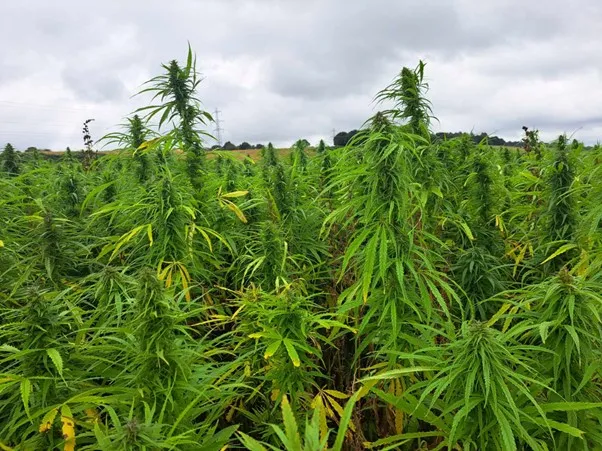Hemp: a climate resilient crop for the future of Scottish agriculture
Project Lead

Challenges
Facing current environmental emergencies, governments worldwide have set themselves ambitious targets to reduce greenhouse gas (GHG) emissions at national levels. Scotland is eager to make a pivotal contribution by setting a target of net-zero GHG emissions by 2045 and reducing emissions by 75% by 2030. In Scotland, agriculture is responsible for 24% of all emissions and has an important role to play in the fight against climate change. Part of the portfolio of mitigation measures to achieve a transition towards climate-neutral land use in Scotland should include GHG removal activities by farmers.
Increasing the extent of agricultural diversity could be a key component in agriculture’s response towards the mitigation of GHG emissions. Hemp used to be part of Scotland’s industry and is suited to both the climate and growing conditions in the main agronomic areas. It has been estimated that 8.9-13.4 tonnes of CO2 are absorbed per hectare of UK hemp cultivation. Our previous research identified various nutritious and sustainable food crops which grow or have the potential to be grown in Scotland. Hemp was identified as having an excellent nutritional profile, being a rich source of protein and dietary fibre and a good source of micronutrient minerals such as magnesium, phosphorus, potassium, calcium, and zinc.
It is recognised that hemp could provide a step-change in agriculture, where farmers combine environmentally and commercially successful management as the next steps to be taken to fulfil Scotland’s environmental ambitions Therefore, hemp could play a role in the development and expansion of a low-carbon, environmentally responsible industry, bringing a new ‘cash-crop’ to Scottish agriculture and creating new opportunities across the supply chain.
Questions
Solutions
This project research supports hemp, a climate resilient crop, for: stimulating Scottish farming sector to run GHG removal activities, identifying opportunities for the Scottish food and drink sector to promote sustainability and by understanding nutrition sufficiency and consumer acceptance of hemp food as part of low carbon footprint diet.
Stimulating the Scottish farming sector to run GHG removal activities
We are working to understand the factors that influence the nutritional composition and quality of hemp grain and subsequent food products, to encourage farmers to cultivate hemp as part of their green initiatives. Hemp has been produced in Scotland for several decades, yet we know little about the nutritional quality of the grain and straw relative to the cultivar, the geographic growing area, and climatic conditions. We are sampling from up to ten Scottish farmers growing hemp for three consecutive years. This year-by-year variation in nutrition, composition, and quality, is giving farmers vital information to plan their future growth expectations.
We are also evaluating the impact of harvest conditions, such as drying temperature and storage, to ensure that the highest quality grain is produced. Farmer-produced hemp foods (oil and flour) are being analysed for their nutrient and chemical content. The results inform us on recommended daily allowances in terms of protein, dietary fibre, microelements, and omega fatty acids and is supporting initiatives to build consumer demand.
Identifying opportunities for the Scottish food and drink sector to promote sustainability
We are identifying the components of the Scottish diet that are unsustainable and contribute to a high carbon footprint and designing and testing hemp-based ingredients as replacements. This underpins new food product development and the exploitation of new market opportunities for the Scottish food sector.
Understanding nutrition sufficiency and consumer acceptance of hemp food as part of a low carbon footprint diet
We are studying the acceptance of hemp foods by engaging with Scottish consumers to evaluate their attitude and receptivity towards swapping staples such as oil, milk and flour (as bread) with hemp-based alternatives. To effectively promote hemp as a food it is essential to assess nutrition sufficiency. We will also compare hemp as part of a low carbon footprint diet with an average Scottish high carbon footprint diet.
Project Partners
Progress
2023 / 2024
The three-year hemp seed sample collection from farmers in NE Scotland growing hemp seed has been completed and the nutritional and chemical characteristics have been assessed and found to be excellent. This study carried out over three years of harvest was performed to understand how location or specific agricultural practices could influence the quality and crop yield. Click here for the summary report.
Hemp protein and fibre rich components (mainly hemp food by-products) have been incorporated into staple foods such as bread and dairy alternatives as part of work to understand the potential of hemp to deliver dietary requirements in terms of protein, omega fatty acids, dietary fibre and minerals. The aim is to promote green food production helping to address problems in sustainable and food-secure nutrition. The hemp bread is being used in the consumer study in year 3.
The consumer study (Acceptance of hemp-based foods) will assess Scottish people’s acceptance towards hemp food and specifically, consumer acceptance towards hemp oil, hemp milk, and hemp bread. The study has received ethical approval ensuring that it is scientifically robust and will be run to the highest standards for safety and integrity. It will be completed in the next project year (2024-2025).
This year we have organised and/or participated in 20 KE events promoting RESAS funded hemp research, covering all aspects of research and the implications it has on environment, agriculture, nutrition and health. We have organised workshops, attended events and open days, and taken part in interviews and podcasts, as well as visiting schools and speaking to the public to translate and educate all the aspects and benefits this crop has on everyone's life.
Furthermore, we have secured additional UKRI funding (over £400,000) for several projects to investigate complementary aspects of current RESAS funded hemp research including 1) the potential as feed, 2) reduction of hemp agricultural waste and 3) implementing hemp as an ingredient in the Scottish diet. This will directly benefit Scottish farmers, the Scottish economy and the Scottish people by addressing societal and environmental problems and offering solutions and opportunities.
This year we have also initiated a pilot study to deliver evidence on hemp benefits to soil and to supporting hemp as a potential rotational crop for Scottish agriculture.
Finally, this year we have been the finalists and the winners of Green Gown award (for Research with Impact), where the hemp research and KE was recognised at a national level for Regenerating Scotland's hemp industry for health, climate, and a green economy.
Relevant publications:
Exploiting Underutilised crops (2023) – a review published in Food Science & Technology by Madi Neacsu and Sylvia Duncan
2022 / 2023
Scottish grown hempseed is a rich source of protein (20-30%), fat (24-31%) and dietary fibre (14%). The work from the 2021 harvest growing trial provided information to Scottish farmers on what is the best variety to grow in Scotland for seed and oil production; this was based on protein and fat content of several varieties analysed. The farmers chose to take forward the Finola variety for 2022 and 2023 trials.
In the first year of this project, we collected and analysed hempseed from the two harvests and grown by 10 farmers in the NE of Scotland. We characterised the nutritional and chemical analysis of the hemp food produced (hemp oil) and its by-products such as hemp cake and fudge.
Based on this research, cold pressed hemp oil was commercially produced and sold in Scotland for the first time in the summer of 2022. Our research showed that hemp oil is a superior source of nutrition in comparison with olive and rapeseed oil, being rich in healthy fats such as omega-3, -6 and -9 fatty acids; 71-77% of the oil is omega-6 and omega-3 acids in a ratio approx. 3:1, ideal for human nutrition. Only 10 g of Scottish hemp oil delivers 2 g of omega 3, which is recommended for maintaining normal blood cholesterol levels. Therefore, it is ideal for consumption as a table oil.
In addition, we have found that hemp oil by-products especially the hemp flour could be used for flour wheat fortification due to their rich mineral content and for food reformulation as it is a rich source of nutrients such as protein, dietary fibre and healthy fats.
In the past year, we have engaged, organised or run 19 different KE events, from stakeholders’ interactions, school activities, science festivals, workshops, agricultural shows to media interviews and article and scientific conferences. This is to raise impact and communicate the Scottish Government funded research at national and international level; to educate school pupils and the general public on research findings related to sustainable food crops and healthy nutrition.
Publications and other outputs
Hemp and buckwheat are valuable sources of dietary amino acids, beneficially modulating gastrointestinal hormones and promoting satiety in healthy volunteers | European Journal of Nutrition (springer.com) (2021) paper published in Eur. J of Nutr. by Neacsu et al.
Applied Sciences | Free Full-Text | Bioprocessing of Hempseed (Cannabis sativa L.) Food By-Products Increased Nutrient and Phytochemical In Vitro Bioavailability during Digestion and Microbial Fermentation (mdpi.com) (2023) published in Appl. Sci. by Fan et al.
Nutraceuticals | Free Full-Text | Buckwheat, Fava Bean and Hemp Flours Fortified with Anthocyanins and Other Bioactive Phytochemicals as Sustainable Ingredients for Functional Food Development (mdpi.com) (2022) published in Nutraceuticals by Neacsu et al.
Previous Projects
Related Projects
Dietary Components of Healthy Diets and their Effects
The current crisis in public health (obesity, diabetes, cardiovascular disease, stroke and some cancers) is strongly rooted in an imbalance in dietary components. A healthy balanced diet not only requires reductions in fat, salt, sugar, and in overall calorie intake, but also an increase in fibre and an appropriate level of protein intake. The aim of this RD is to strengthen our understanding of the role of dietary components (in particular fibre and protein) in a healthy diet.
